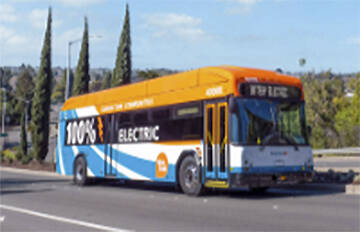The Bainbridge Island City Council is ready to get moving on transportation after finding funds to pay for research.
The council has expressed a desire for a Winslow circulator and other transit improvements due to the lack of public transportation on BI, especially at night and from the ferry dock, between Winslow and Lynwood Center, and connecting Winslow to other business areas.
The council recently voted against the study because the cost was out of the budget cycle. But some councilmembers asked city manager Blair King about funds from the $10 local increase in the vehicle license fee. King found that $117,000 was unspoken for. So the council voted Aug. 13 to use $30,000 of that to find out baseline public transportation information such as: potential ridership, costs, regulations, technology, service providers and operations.
Councilmember Kirsten Hytopolous was concerned about the funds being requested outside the normal process before, but since money is available, “I’ve always supported the idea of getting a circulator going downtown.”
Councilmember Clarence Moriwaki agreed, adding he’s glad to have the project “set in motion” because the money is in the “wheelhouse” for the project.
Councilmember Leslie Schneider said the fund brings in $200,000 a year, so it may be able to pay for a pilot project in the future.
King said he expects the research to take up to six months, but that city staff also hopes to use some of the Transportation Benefit District money for traffic calming around town.
Circulator bus transit is a short-distance, fixed route that takes riders around a specific area with major destinations.
Hotels
BI now has a definition for a hotel. But it likely won’t see any action until the Winslow Subarea Plan is done. That is unless “the Planning Department gets a request, whichever comes first,” Moriwaki said.
“I’m excited and happy to move this forward,” deputy mayor Ashley Mathews said.
Hytopoulos reminded everyone that hotels used to be permitted in Winslow but a project a few years ago “didn’t make a lot of people happy,” so they have been put on hold.
In June, the Planning Commission discussed a definition for hotels: Buildings that contain guest rooms where lodging is provided for transient visitors.
The commission wants to discourage vehicle traffic to any hotels downtown; instead having customers use shuttles or bicycle rentals. The commission also wants to require additional water conservation and limit size, such as 60 rooms, depending on zoning.
Groundwater
Public Works director Chris Wierzbicki gave the council an update on the Groundwater Management Plan.
He said the city’s consultant is looking at sea level rise, precipitation, population and recharge impacts. Results, analysis and draft strategies will be presented to the council next month.
He said different models are being researched. For example, regarding sea level rise, it could be a low of 2.8 feet and a high of 6.9 feet over the next 100 years. In that same timeframe, population could be anywhere from 46,380 to 70,010.
Wierzbicki said more rain is predicted for the future, which means more recharge. Drier summers also are predicted, meaning more irrigation needs. So there are many factors, including the probability that it will need to make an agreement with Kitsap Public Utility District to draw water from in the future.
Moriwaki said technology is making it easier to capture water. He mentioned more severe storms are predicted for the future, which could be captured, similar to what the pond does at the Japanese American Exclusion Memorial.
Schneider said rainwater collection at a single-family home could provide enough water for a year. She said water conservation also could play a role. “We could draw that down,” she said of water usage.
Historic preservation
The council agreed to put the Historic Preservation Commission on hiatus. The commission recently resigned en masse due to issues with city staff and the council. Not enough candidates applied to take their place. So the Planning Commission took over some of its duties. It will continue to do that until the next biennium.
King said during this time the city can look at how other communities handle historic preservation.
“Apparently our community isn’t interested” in historic preservation since not enough qualified people applied, Moriwaki said.
Councilmember Jon Quitslund, who was the liaison to the historic panel when it dissolved, said if BI no longer has interested applicants with the expertise needed, maybe the certified program has to go. “Do we want to maintain it?” he asked of the high standards set for it in the city’s Comprehensive Plan. Of the mass resignation, he called it, “A collapse of political will, a loss of a sense of purpose and a failure on all sides.”
Hytopolous called the Planning Commission stepping in a “temporary act. The Planning Commission is not qualified” to do the job, she said, adding BI shouldn’t have to wait 2 1/2 years for a new historic commission to be named. She said there are plenty of people who “care a lot about preserving the little bit of history we have left.”
Weeds
The council approved 3-2 hand-pulling of noxious weeds along NE Wing Point Drive. The council was split because of the $20,000 cost compared with the use of chemicals to do the job.



